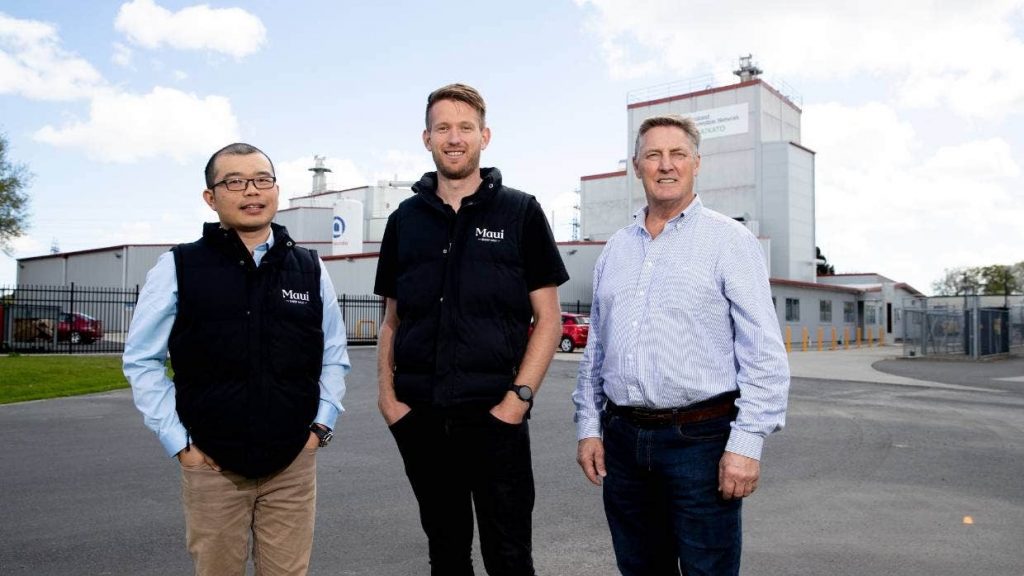
That’s impressive given there were just under 30 farmers supplying the milk to two manufacturers, all based in the Waikato region.
It comes as the two main players Maui Sheep Milk and Spring Sheep New Zealand enter a new growth phase in their meteoric rise to fame.
Spring Sheep had 16 farmer suppliers and 15,024 of its special Zealandia milking sheep, with plans to expand to 40,000 sheep by 2025.
Maui was supplied by 13 farmers using 13,000 of its Southern Cross dairy sheep breed. It was reviewing supply and demand closely before releasing more stock for new farmers.
All of their milk was processed at the Food Waikato milk processing plant at the Waikato Innovation Park in Hamilton.
Figures shared by Food Waikato showed there were 105 tonnes of sheep milk processed in 2016-17, with an export value of $2.2m.
That increased to 522 tonnes and $11m for the just ended 2020-21 season.
The forecast for the current and following two seasons showed an increase in export value from $21.2m, to $32.9m and $44.6m expected in 2023-24.
Food Waikato chief executive Stuart Gordon said the dairy sheep industry started from “just a vision” to now a major export earner with more international markets on the horizon.
“Spring Sheep and Maui now have proven genetics, proven farm systems and profitability, they know how to farm dairy sheep sustainability and how to manufacture.”
There was “definite demand” for dairy sheep milk, it had a distinctive taste, looked whiter than cow’s milk and had some “benefits around digestibility”.
Research promoted sheep milk as A2 protein which contained more key nutrients than bovine milk.
“Waikato is the centre of it at the moment but there is a lot of interest in the South Island and I would expect someone to pick it up there in the next five years.
“What we have to be careful of is getting ahead of the demand curve. We’ve had examples in the primary sector where we’ve gone out too hard and had over supply.
“Sheep milk needs to be processed and has a shelf life so if there is over supply, value can drop quickly.”
Prices for dairy sheep milk were attractive, hovering between $16 to $17/kg total milk solids in recent seasons.
Those converting to dairy sheep were former dairy cow farmers, sheep (meat and wool) farmers as well as corporate or trust farms.
Some were looking to diversify, having a mixture of dairy cow and dairy sheep farms in one business.
The uptake of dairy sheep farming had also sparked up activity in the agri-tech industry with Waikato Milking Systems, GEA and DeLaval developing new milking systems designed for sheep or helping farmers convert old cow sheds for sheep milking.
Smaller dairy cow farms, 50 to 60 hectares may no longer be viable but present as an ideal proposition for the smaller environmental footprint needed to farm sheep for their milk.
Waikato had become the epicentre for dairy sheep because of its flat land and the central location of the innovation park’s factory, within 60 to 90 minutes tanker drive from the furthest supplier.
Maui Milk was formed six years ago, jointly owned by Shanghai-based Super Organic Dairy and Māori farming trust Waituhi Kuratau.
Its rapid growth triggered a recent change in ownership when Super Organic Dairy purchased the trust’s share to form the Maui Food Group.
There were new roles in marketing, supplier support, sales and supply chain management and it had expanded its office at the innovation park.
It had also recently launched a dedicated website for its Southern Cross dairy sheep, providing details on its sheep milk genetics programme.
Chief executive Leah Davey said the change in ownership allowed the business to access more capital to grow, open new markets and secure new customers.
It would continue to supply dairy giant Danone for its Karicare Sheep Milk Formula but it would now diversify its product range.
“We see opportunities in nutrition products for children, adults, medical and sport industries, those will be the foundation to build the product range.
“We’re also looking at partnering with brands who have an interest is those products.”
China was a key market but the US, Taiwan, Japan, Singapore and other “pockets of Asia” were also on the company’s radar.
The company also planned to raise its profile at international trade shows despite the challenge of border closures.
“We’ve had to think a bit differently here and we’re engaging with local partners to present Maui Milk on our behalf and appearing virtually as well.”
Raising the profile among Kiwis was also in the mix.
“Awareness is growing and it’s been helped with the media, that goes a long way to educate our own consumers about the value of sheep milk.”
Spring Sheep is a joint venture between state-owned farmer Pāmu and food marketer SLC Ventures. It also had an office at the Waikato Innovation Park and another in Auckland.
Its chief executive Nick Hammond said access to high performance dairy sheep genetics from Europe had changed the game for New Zealand’s advances in the industry.
“A normal sheep in New Zealand can produce 60 to 90 litres of milk in a season but a high performance dairy sheep typically produces 300 to 400 litres a year.
“Our highest performing sheep produced 600 litres.”
Hammond said lifting production capacity had created a viable farm model for New Zealand to join but there was caution around growing too fast.
“That is something we are conscience of and we control our milk pool very closely.
“We only release a certain number of our milking sheep per season and because we control our breed we are able to control the amount of milk being generated from our farms.”
Spring Sheep had its own stud farm and research and development farm near Cambridge and Hamilton while Maui had its breeding farm near Taupō.
Both companies held open days when they shared information about their progress.
“Maui and Spring Sheep have a very collaborative approach to innovation, that means we can also avoid having over supply, we can align our thinking for the long term interest of the industry.”























